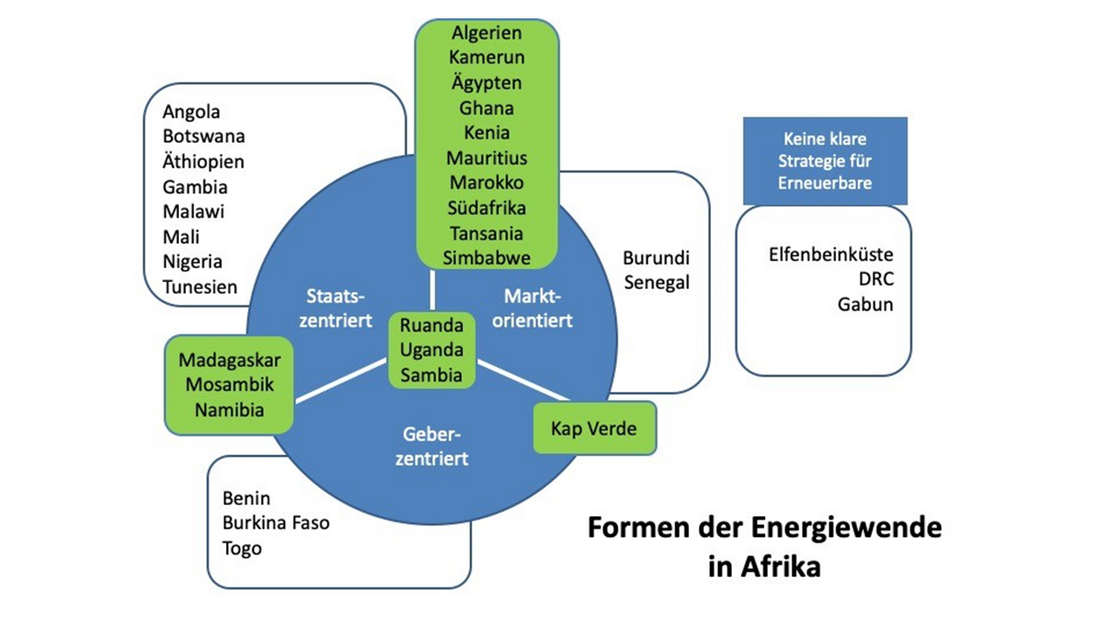This page contains automatically translated content.
How fair is the energy transition in Africa?
 Image: Glocalpower.
Image: Glocalpower.This question is being investigated by the BMBF junior research group "Glocalpower" at the University of Kassel in collaboration with the University of Hamburg. In a new study, the researchers involved are analyzing a total of 34 African countries with regard to the question of what measures are being taken to establish renewable energies.
Same goal, different paths
"Virtually all of the African countries whose energy policies we studied share the goal of a high level of energy sovereignty - but there are different ideas about the right way to get there," says Dr. Simone Claar, head of the BMBF junior research group.
South Africa, Kenya and Rwanda, for example, were very quick to open up to the expansion of renewable energies. In other countries, however, there are obstacles. "Resource-rich countries like Angola in particular have little interest in change. They rely on oil," Claar says.
In total, the researchers at the University of Kassel mapped 34 African countries using policy papers and created a freely accessible database. The researchers identified policy, ownership, donor alignment and consideration of energy equity as key levers for energy sovereignty.
African countries intensively promote energy transition
The numbers are impressive: while the countries studied invested $1.2 trillion in 2006, spending rose to $19 trillion by 2017. "These figures show us that government and private investment has increased in many countries," says Dr. Claar. "Overall, the study shows that governments are predominantly using market mechanisms. In South Africa, competitive bidding was able to achieve lower prices for renewable energy generation and add circa six gigawatts of electricity." Examples abound about the different paths to energy transition:
Rwanda's national energy strategy combines various instruments. The country relies on microfinance, clean cooking programs, biofuel blending, or building female expertise in renewable energy technology, among others.
Cape Verde's main policies are donor-centric. The country receives financial support from the African Development Fund and the Portuguese and Luxembourg development aid agencies. The government developed a renewable energy policy program in 2010 with support from the consulting firm Gesto Energia S. A.
Uganda's government has worked with the German development bank KfW, Deutsche Bank, the Norwegian government, and the British government, among others, in the context of the Global Energy Transfer Feed-In Tariff. In parallel, the World Bank has provided guarantees to private investors to hedge risks.
Criteria for energy justice
But simply establishing renewable energy in countries is not enough, he said. "There also has to be a 'just transition,' that is, a just structural change," Claar says. "That means as many people as possible must not only have access to energy, as formulated in the United Nations Development Goal 7." She cites the construction of wind farms as one example: "When a large wind farm is built, residents should not only receive the energy, but also be involved in the entire process and benefit from a transfer of knowledge so that new jobs can be created."
Some of the countries studied differ significantly in this regard. "With our work, we want to provide a building block for learning about best-practice examples from other countries and thus support the energy transition in African countries," says Dr. Claar.
The project: Glocalpower
Glocalpower is funded by the BMBF. On March 1, the project became a joint project between the University of Kassel and the University of Hamburg. The German scientists are researching the topic together with local partners in Zambia, Ghana and South Africa. Together, local workshops are also planned from the end of 2021.
The junior research group has published the research results in an OpenAccess article in Energy Research and Social Science.
The study:
"Is green a Pan-African color? Mapping African renewable energy policies and transitions in 34 countries" by Franziska Müller (University of Hamburg), Simone Claar (University of Kassel), Manuel Neumann (University of Kassel), Carsten Elsner (University of Kassel).
Available publicly at: http://tiny.cc/AfricanEnergyPolicies
The research for this article was funded by the German Federal Ministry of Education and Research [grant number: FKZ 01LN1707A].
Contact:
Dr. Simone Claar
Head of BMBF project "Glocalpower"
University of Kassel
Department of Globalization and Politics
Tel.: 0561 804 - 3931
E-mail: sclaar[at]uni-kassel[dot]de
Twitter: https://twitter.com/simoneclaar